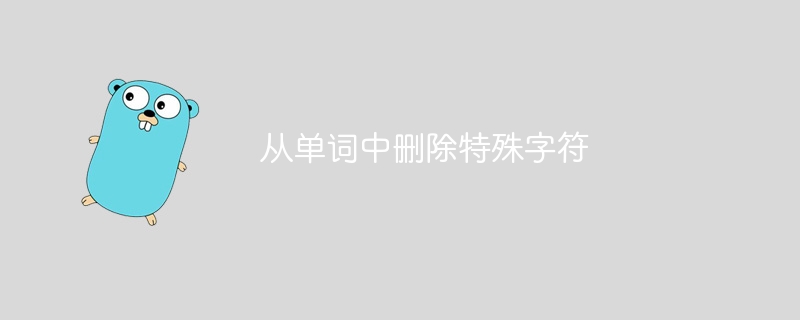Remove special characters from words

I am writing a function in go to clean individual words, thereby removing special characters at the beginning and end of each word.
Right now:
- .-Hello,->Hello
- "Back to Back"->Back to Back
I get the following result by checking each end letter by letter to see if it belongs to the unicode.letter set, which works great, but I'm wondering if there is a better or more efficient way to do this? I tried strings.trimleft/right, but then I had to define my own set of characters to remove. It would be nice to use predefined collections.
func TrimWord(word []rune) string {
var prefix int = 0
var suffix int = len(word)
for x := 0; x < len(word); x++ {
if !unicode.IsLetter(word[x]) {
prefix++
} else {
break
}
}
for x := len(word) - 1; x >= 0; x-- {
if suffix == prefix {
break
}
if !unicode.IsLetter(word[x]) {
suffix--
} else {
break
}
}
return string(word[prefix:suffix])
}Correct answer
package main
import (
"fmt"
"strings"
"unicode"
)
func trimword(s string) string {
return strings.trimfunc(s, func(r rune) bool {
return !unicode.isletter(r)
})
}
func main() {
fmt.println(trimword(`.-hello,`)) // -> hello
fmt.println(trimword(`"back-to-back"`)) // -> back-to-back
}https://www.php.cn/link/55053683268957697aa39fba6f231c68
hello back-to-back
func TrimFunc(s string, f func(rune) bool) string
trimfunc returns a slice of string s with all leading and trailing unicode code points c removed that satisfy f(c).
The above is the detailed content of Remove special characters from words. For more information, please follow other related articles on the PHP Chinese website!

Hot AI Tools

Undresser.AI Undress
AI-powered app for creating realistic nude photos

AI Clothes Remover
Online AI tool for removing clothes from photos.

Undress AI Tool
Undress images for free

Clothoff.io
AI clothes remover

AI Hentai Generator
Generate AI Hentai for free.

Hot Article

Hot Tools

Notepad++7.3.1
Easy-to-use and free code editor

SublimeText3 Chinese version
Chinese version, very easy to use

Zend Studio 13.0.1
Powerful PHP integrated development environment

Dreamweaver CS6
Visual web development tools

SublimeText3 Mac version
God-level code editing software (SublimeText3)

Hot Topics
 How do I write mock objects and stubs for testing in Go?
Mar 10, 2025 pm 05:38 PM
How do I write mock objects and stubs for testing in Go?
Mar 10, 2025 pm 05:38 PM
This article demonstrates creating mocks and stubs in Go for unit testing. It emphasizes using interfaces, provides examples of mock implementations, and discusses best practices like keeping mocks focused and using assertion libraries. The articl
 How do you write unit tests in Go?
Mar 21, 2025 pm 06:34 PM
How do you write unit tests in Go?
Mar 21, 2025 pm 06:34 PM
The article discusses writing unit tests in Go, covering best practices, mocking techniques, and tools for efficient test management.
 How can I define custom type constraints for generics in Go?
Mar 10, 2025 pm 03:20 PM
How can I define custom type constraints for generics in Go?
Mar 10, 2025 pm 03:20 PM
This article explores Go's custom type constraints for generics. It details how interfaces define minimum type requirements for generic functions, improving type safety and code reusability. The article also discusses limitations and best practices
 How do you use the pprof tool to analyze Go performance?
Mar 21, 2025 pm 06:37 PM
How do you use the pprof tool to analyze Go performance?
Mar 21, 2025 pm 06:37 PM
The article explains how to use the pprof tool for analyzing Go performance, including enabling profiling, collecting data, and identifying common bottlenecks like CPU and memory issues.Character count: 159
 How can I use tracing tools to understand the execution flow of my Go applications?
Mar 10, 2025 pm 05:36 PM
How can I use tracing tools to understand the execution flow of my Go applications?
Mar 10, 2025 pm 05:36 PM
This article explores using tracing tools to analyze Go application execution flow. It discusses manual and automatic instrumentation techniques, comparing tools like Jaeger, Zipkin, and OpenTelemetry, and highlighting effective data visualization
 Explain the purpose of Go's reflect package. When would you use reflection? What are the performance implications?
Mar 25, 2025 am 11:17 AM
Explain the purpose of Go's reflect package. When would you use reflection? What are the performance implications?
Mar 25, 2025 am 11:17 AM
The article discusses Go's reflect package, used for runtime manipulation of code, beneficial for serialization, generic programming, and more. It warns of performance costs like slower execution and higher memory use, advising judicious use and best
 How do you specify dependencies in your go.mod file?
Mar 27, 2025 pm 07:14 PM
How do you specify dependencies in your go.mod file?
Mar 27, 2025 pm 07:14 PM
The article discusses managing Go module dependencies via go.mod, covering specification, updates, and conflict resolution. It emphasizes best practices like semantic versioning and regular updates.
 How do you use table-driven tests in Go?
Mar 21, 2025 pm 06:35 PM
How do you use table-driven tests in Go?
Mar 21, 2025 pm 06:35 PM
The article discusses using table-driven tests in Go, a method that uses a table of test cases to test functions with multiple inputs and outcomes. It highlights benefits like improved readability, reduced duplication, scalability, consistency, and a






